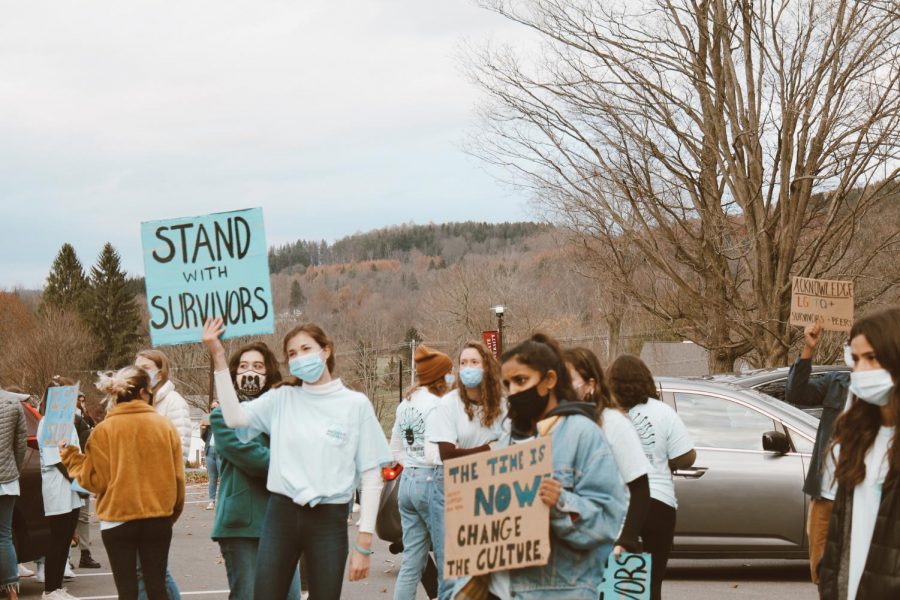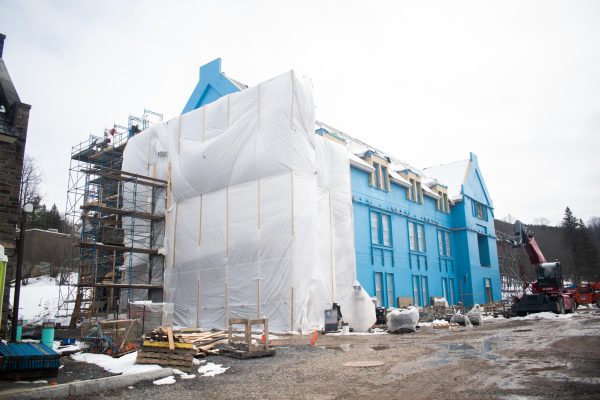Medusa Movement Leads Survivor Solidarity Protest, Administration Responds To Demands
The Medusa Movement, a student-led activist organization, led a solidarity protest on Colgate Day to stand with survivors of sexual violence whom students say the University has failed to support. Instead of celebrating Colgate Day on Friday, Nov. 13, the movement encouraged the student body to purchase protest t-shirts and to wear teal, the universal color for sexual violence awareness. The protest included a march to James B. Colgate Hall — where the Offices of the President and the Office of Admission are located — in order to present a list of demands created by the Medusa Movement and to host a student speak-out.
Multiple administrators have since responded to frustration that they did not appear at the protest or the speak-out. President Casey explained that the Movement was made aware of a schedule conflict, which was an interview with the finalist candidates for the Chief Diversity Officer.
Student organizers sold 600 shirts through a t-shirt campaign, 150 of which were sponsored by around $2,500 in donations from alumni, parents, faculty and students. The movement raised over $600 in donations for Help Restore Hope, a domestic abuse treatment center based in Madison County.
“The idea of the t-shirt campaign came about as an effort to build community and student power in a COVID-friendly manner through centering the narratives of survivors on campus in order to disrupt the ‘picture perfect’ messaging we are all so used to seeing on Colgate Day,” senior Ali Altman said, one of the protest organizers.
The Medusa Movement organized the protest in collaboration with Sisters of the Round Table (SORT), Black Student Union (BSU), Lambda, South Asian Cultural Club (SACC), the Colgate Student Coalition (CSC) and other campus groups.
Participants of the protest gathered in front of the University chapel at around 3:00 p.m. on Nov. 13 and heard speeches from junior Mackenzie Harrison, Student Government Association (SGA) president senior Amarachi Iheanyichukwu, Medusa Movement co-founder senior Jailekha Zutshi, and seniors Harleen Kaur and Melissa Verbeek. Organizers then led a march down the hill to James B. Colgate Hall, where senior Helen Ferguson read the list of demands and students were given the opportunity to stand and tell their stories. The protest was done so as to follow community health guidelines with masks, social distancing and different protesting locations.
“The protest meant a lot to me, as a student and survivor — it felt like there was potential for change and increased support for survivors. There needs to be more transparency and dialogue involved in this process, and I’m glad the Medusa Movement was founded,” sophomore Janiiya Hart said after speaking out at the protest.
Co-founded by seniors Ferguson, Zutshi and Sofia Perez-Dietz in early August, the group describes itself on Instagram as a student-led activist group made up of survivors and allies that strives to make Colgate a more survivor-centric and trauma-informed community. They take an intersectional, inclusive and LGBTQ+ conscious approach in this effort. Perez-Dietz explained that the dismissal of Colgate Day was to acknowledge the ways in which Colgate’s campus is not a safe space for sexual assault survivors, especially those that identify as BIPOC and LGBTQ+.
Perez-Dietz said the hope for the protest was to bring survivors’ concerns to the forefront to combat unawareness on part of the administration or community members, as well as to deliver demands and action steps to the administration. Altman added that a goal of the protest was to centering survivors “on a day that their stories are otherwise silenced” and creating a space to elevate student voices.
“[These goals were] certainly met with overwhelming support from the student body,” Altman said. “However, it is clear that the movement has a lot more work to do, both internally and externally, to address systemic issues on campus and meet the needs of the student body. We are working hard to decolonize our work and find better ways to center the voices of BIPOC and LGBTQ+ students in the process. This is only the beginning, and we have to start somewhere!”
The Medusa Movement’s Continued Action Plan demands that the administration increase transparency and accessibility to Title IX policies, provide all parties with access to legal advice, bolster support services through Haven and give amnesty to survivors who report sexual violence that occurred in violation of the Commitment to Community Health. Since the list of 11 demands presented to the University by Colgate Forward and the Association of Critical Collegians in 2015, changes were made in support for survivors of sexual assault, including the founding of Haven and the availability of SANE exams at Community Memorial Hospital.
“[Members of the administration] are well aware of who we are, what we stand for, and what we are trying to achieve on campus. In addition to getting their attention digitally with the #ColgateUnsafe hashtag and tagging @colgateuniversity in our posts, we invited them to our speak out on Friday, which they intentionally chose not to attend—despite our intentional efforts to occupy the space outside of Admission where President Casey’s office is,” Altman said.
According to University President Brian Casey, Senior Advisor to the President Christopher Wells, multiple members of the University Cabinet including Vice President for Communications Laura Jack, as well as Chief of Staff and Secretary to the Board of Trustees Hanna Rodriguez-Farrar, faculty members and Casey himself were in meetings during the protest with potential new Chief Diversity Officers, something of which he said protest organizers had been made aware.
“We — me, the provost, the head of communications, several deans — we had all scheduled interviews with the Chief Diversity [Officer] candidates on that day. They knew that. And so this whole, ‘I can’t believe they’re not coming here,’ [was frustrating]. It was really hard to schedule all these events,” Casey said. “The irony [was] that the protest was happening on the day that we’re interviewing finalist candidates for the Chief Diversity Officer, who is going to run the Title IX office.”
Casey also said that he and other members of the administration met with members of the Medusa Movement multiple times throughout the semester. He said that in light of their multiple meetings, the claim that the movement is not being heard is incredibly frustrating for him.
“I have personally met with the Medusa Movement several times. Christopher Wells [and] Hanna Rodriguez have [also] met with them several times. We have scheduled further conversations with them, so this framing of ‘We are not being heard’ is really quite disrespectful of a number of administrators who have done nothing but meet with them,” Casey said.
The Medusa Movement sent an email on Nov. 13 addressed to Colgate Administration which emphasized the presences of sexual violence on Colgate’s campus, citing the HEDS survey data from 2019 and the first-hand accounts shared on the Share Your Story Instagram page, and inviting Colgate administration to join students at the Nov. 13 protest. The email presented their list of demands, as well as an alumni petition pledging to direct donations on Colgate Day only to support programs, educational resources and spaces of support on campus for survivors, including Haven, the Center for Women’s Studies and the Africana, Latin, Asian and Native American (ALANA) Cultural Center.
“While we appreciate how the administration has been willing to listen to our concerns, we are dissatisfied by the lack of urgency and action that has been taken in order to sufficiently meet the unique needs of survivors on this campus, especially in the light of the recent Title IX regulation changes, presidential election, and ongoing COVID-19 pandemic. We feel that some of the grassroots work of our movement has been co-opted, and thus it has become necessary to go public with our demands today, Nov. 13, 2020,” the email stated.
The Medusa Movement received an email response from Wells on Nov. 18, inviting student leaders to schedule another conversation with senior administrators and explaining that office representatives will continue to engage with the Medusa Movement and other interested students. He included multiple projects he would be happy to discuss including adaptation to Title IX and building on steps taken over the past several years, including the creation of Haven, the implementation of the SANE nurse program, the creation of bystander intervention and peer ambassador programs, and expanded education in new student orientation as efforts.
“There may be issues on which we disagree about what is practically possible, or strategically wise, but there are surely far more steps about which we can agree, and in which our best insights and ideas, brought together, will serve the campus and its students well. Sorting through these together will most effectively and efficiently strengthen our efforts and will avoid circumstances in which battle lines are drawn over issues about which there is absolutely no disagreement,” read the email.
Altman said that, although the Medusa Movement was disappointed at the administration’s response, student leaders will look towards continuing discussion in an effort to implement change.
“While [the administration’s absence] was certainly disappointing, I believe their absence speaks much louder than the email response,” Altman said. “We certainly got their attention and they’ve agreed to open a dialogue and continue to collaborate with us to negotiate and implement the demands we presented on Friday.”
Casey expressed further frustration with the Movement’s claim that their list of demands are not being met. He said he feels that many of the movement’s demands have already been largely implemented by the University, including a two-page breakdown of Title IX procedures last summer when the new rules went into place, and providing legal counsel to students who report sexual misconduct.
“The four major demands, we’re doing three of them already. Now they wanted one page [title IX reporting process breakdown], ours happens to be two, but I feel… not only was ours so good, two other NY6 schools copied it. The other demand about [Colgate providing] legal counsel – we led that effort to find the request for proposals. We started this in July,” Casey said. “So I have to admit that I’ve worked with lots of student groups over 25 years and I found this to be confounding, the framing of this.”
According to Wells, there is also already protection in place for survivors who report sexual assault. Pre-pandemic, amnesty allows the University to set aside violations of the Student Code of Conduct to protect survivors. Since violations of the Commitment to Community Health are not violations of the Code of Conduct, these violations do not lead to a conduct record, which is a built-in protection for survivors.
“These violations are handled administratively and do not lead to a conduct record,” Well said. “Having said that, the university has to take violations of the Commitment very seriously; they represent real, and potentially fatal risks to other people. The University has an obligation to uphold the Commitment to Community Health, and to respond with necessary public health measures when there have been breaches, in order to protect the health and safety of all members of the community.”
Wells and Vice President and Dean of the College Paul McLoughlin have also been working on increasing staff at Haven, another of the movement’s demands, and the University continues to adapt orientation and bystander intervention training in accordance with COVID-19 restrictions, according to Casey.
“The University’s in a total [hiring] freeze but as soon as we can we are looking at that [for the Assistant Director position],” Casey said. “This years’ first-year orientation was odd, but we had added a whole layer of training on this topic that we’ll keep doing. So you keep fighting the fight. A posture of cooperation and help would be welcomed by us. Because having a whole lot of students who care about this issue will actually move the needle more permanently than almost anything else.”
According to Casey, the University furthermore immediately notified Haven and the Title IX office once United States Secretary of Education Betsy DeVos’s changes to Title IX were made, later taking action to adopt a legal standard and increase staffing at Haven in an effort to bolster support for survivors.
“We adopted the most survivor centric-thing you can do: we adopted a legal standard. We lead the discussion with the New York Six [Liberal Arts Consortium] (NY6) to provide a pool of lawyers and judges to help, so I find this demand to do things we’ve been doing since we got word of it, to be…. baffling…untrue and confounding,” Casey said.
Perez-Dietz expressed frustration with the Administration’s response.
“I personally feel like the administration does not understand how many students are unsafe on campus, and seem wholly unaware of the harm they perpetuate,” Perez-Dietz said. “The movement is meant to bridge survivors and allies with bystanders or unaware community members so that we can make a more survivor-centric community.”
Altman expressed similar sentiments, calling to attention the role of the University in perpetuating unsafe environments on campus.
“I think the University, institutionally, plays a great role in perpetuating an unsafe environment for survivors on campus. Where they choose to allocate funding, what stories they choose to believe, which student groups they give social permissions to, and who they choose to listen to – all matters. The University plays an enormous role in not only shaping and defending rape culture as it exists on campus, while simultaneously serving as a huge hinderance for survivors seeking justice because they choose to prioritize bureaucratic processes over the healing and rights of survivors,” Altman said.
Casey said he looks forward to continuing collaborating with students to create change beyond measures carried out since 2015.
“I am willing, excited; [the] door is open to keep talking. I will gladly work with anybody who wants to sit down at a table. But, I have a hard time working with people who are shouting demands at me versus working with us when we’ve shown, from the beginning, that we’re going to work [with them]. I’ll leave it only with this: this is deeply, personally important to me, from personal experience…. it has been since I’ve gotten here,” Casey said.
Altman said students and the University have to work together in order to create change on campus as both are responsible for shaping the safety and experience of students on campus.
“Sexual violence on campus is pervasive, and the University assumes just as much responsibility in perpetuating it as does the student body at large. They have to commit to collaborating with students, just as students have to commit to collaborating with the admin, if we are ever going to see real change,” Altman said. “[Students] showing up on Friday was a start, but I hope that listening to the speakers and sitting with the realities of rape culture on campus encourages students to think critically about the ways that they are complicit in it.”
Sara Fraser is a junior from Memphis, TN concentrating in environmental studies with a minor in sociology. She has previously served as a staff writer...










